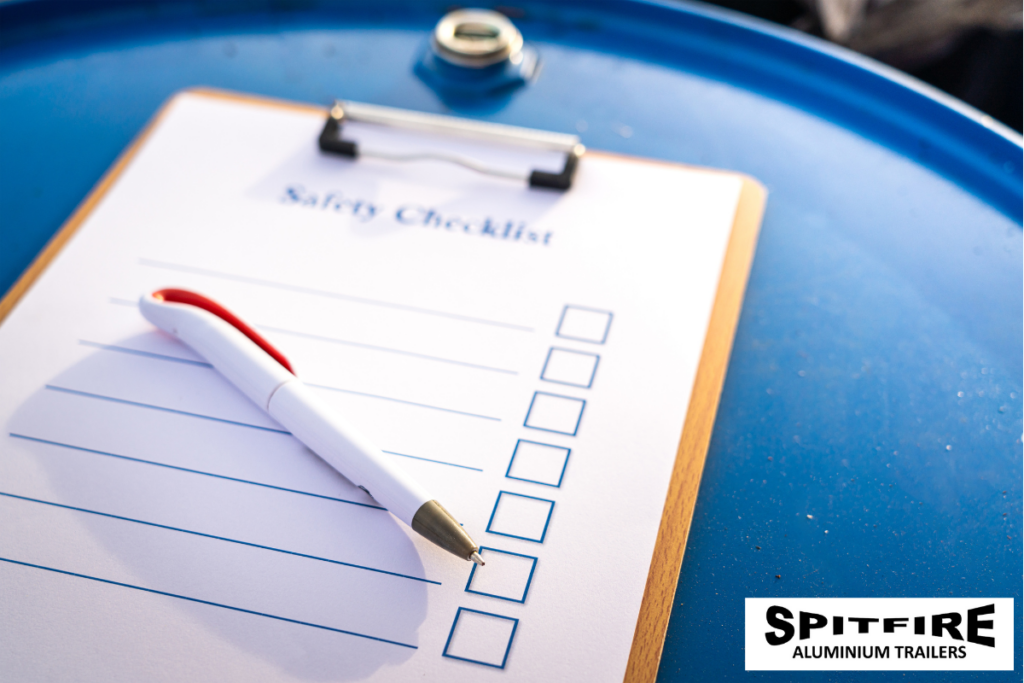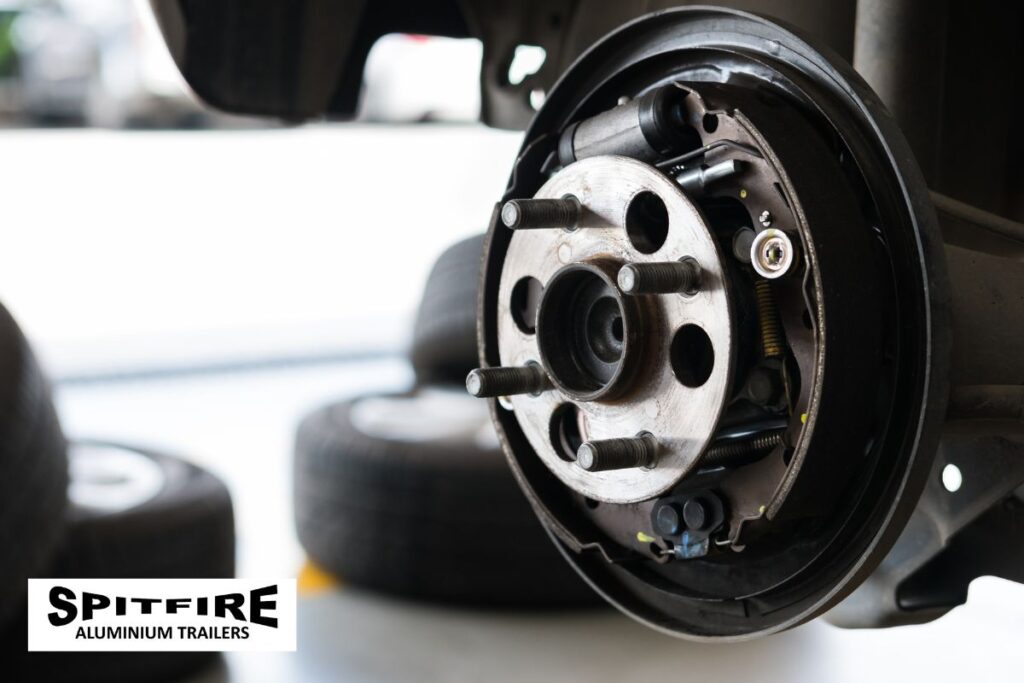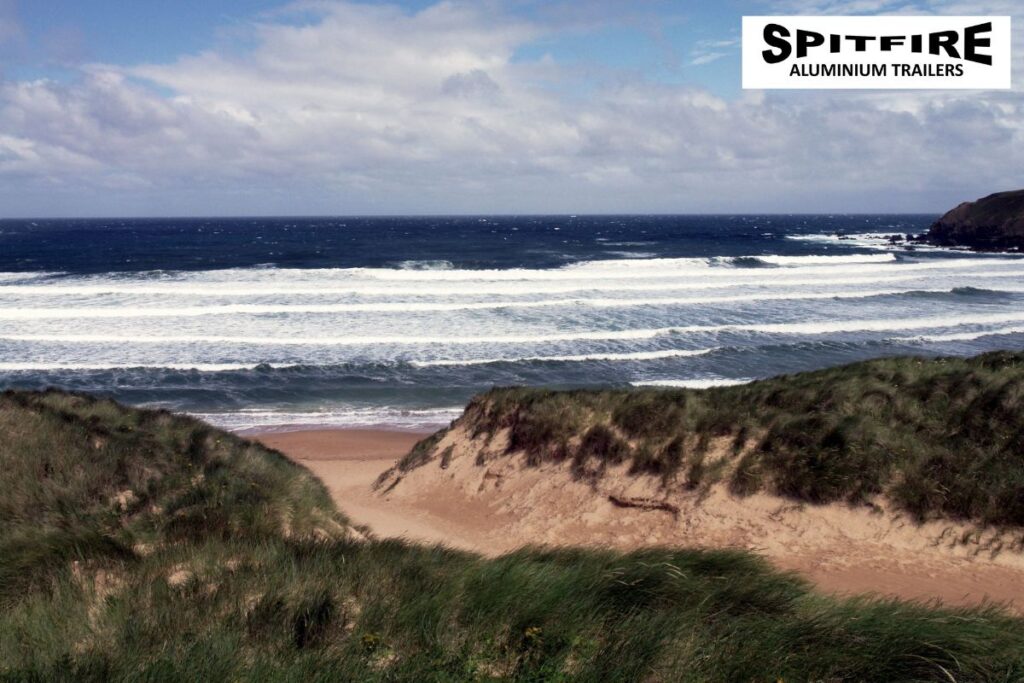Spitfire Boat Trailers
5 Essential Safety Checks Before Towing Your Boat Trailer
Are you ready to hit the road with your boat trailer? Have you checked everything on your pre-tow checklist? It’s important to do safety checks before towing your boat trailer. This ensures a safe and fun trip. We’ll cover the key safety checks you need to do, like a boat trailer safety inspection.
Key Takeaways
- Regular safety checks before towing your boat trailer can prevent accidents.
- A pre-tow checklist for boat trailers is key to ensure everything works right.
- Check your trailer hitch and coupling system before towing.
- Also, inspect your weight distribution and loading techniques during a boat trailer safety inspection.
- Make sure your trailer brake and electrical systems are working well for a safe tow.
- By following these steps, you can reduce the risk of accidents and have a smooth towing experience.

Understanding the Importance of Pre-Tow Safety
Before you tow your boat trailer, knowing the importance of safety is key. In Australia, accidents can happen due to bad loading, faulty gear, or driver mistakes. To tow safely, follow tips for towing boat safely and stick to boat trailer safety guidelines.
Doing a detailed boat trailer hitch inspection is vital. It helps spot problems early. This way, you can avoid accidents. Also, knowing the laws and insurance for towing in Australia is important.
Common Towing Hazards in Australia
Some common accidents include jackknifing, trailer sway, and brake failure. These happen due to bad loading, faulty gear, or driver mistakes. To avoid these, follow tips for towing boat safely and stick to boat trailer safety guidelines.
Legal Requirements for Boat Trailer Towing
In Australia, towing a boat trailer has its own rules. You must register your trailer and have the right licenses and permits. Also, know the weight limits for your trailer and don’t go over them.
Insurance Considerations
Think about insurance when towing a boat trailer. Make sure you have enough coverage for your trailer, its contents, and any damage or injury. Knowing the laws and insurance for towing helps make your trip safe and fun.
Safety Checks Before Towing Your Boat Trailer: The Complete Guide
When towing your boat trailer, safety is key. It’s important to follow the best practices to avoid accidents. A safety checklist helps you remember all the important checks before you start.
Remember to check your trailer hitch and coupling system often. Make sure your trailer is loaded correctly and your brakes and electrical systems work well. These steps help keep you safe and make towing enjoyable.
- Inspect your trailer hitch and coupling system for any signs of wear or damage
- Check your weight distribution and loading techniques to ensure they are even and secure
- Verify your trailer brake system and electrical system are functioning properly
By doing these safety checks and following the best practices, you ensure a safe and fun journey.
Inspecting Your Trailer Hitch and Coupling System
Regular checks on your boat trailer hitch are key for safe towing. These pre-tow checks prevent accidents and protect your trailer and vehicle. A detailed inspection helps spot issues early, avoiding bigger problems later.
Start by examining the ball mount and hitch assembly. Make sure they’re securely attached and working well. Look for loose bolts, nuts, or any damage.
Checking the Ball Mount and Hitch Assembly
Inspect the ball mount and hitch for wear or damage. Also, check the hitch pin and clip to ensure they’re in place.
Safety Chain Inspection and Setup
Don’t forget to check the safety chains too. They should be set up right and in good shape. Look for wear or damage and make sure they’re attached to both the trailer and vehicle.
By doing these inspections regularly, you can keep your towing safe. Remember, pre-tow checks are vital for a safe towing experience.
Inspection Item | Description |
Ball Mount and Hitch Assembly | Check for secure attachment and good working condition |
Safety Chains | Inspect for proper configuration and good condition |
Coupling Mechanism | Test for proper function and secure attachment |
Proper Weight Distribution and Loading Techniques
When towing your boat trailer, loading it right is key. You must spread the weight evenly across the axles. A weight distribution analysis helps find the best weight balance for your trailer.
Begin by placing your boat in the trailer’s center. Use tie-downs to secure it and ensure even weight. A trailer towing checklist can help you remember important steps. These steps help avoid accidents and make towing smoother.
Important factors for loading your boat trailer include:
- Weight capacity: Don’t overload your trailer to avoid instability and accidents.
- Balance: Spread the weight evenly to prevent wear and tear.
- Securing: Use tie-downs and other devices to keep your boat stable during transport.
By following a proper loading procedure and analyzing weight distribution, you can safely load your trailer. Always check your trailer towing checklist to avoid missing any steps.
Remember, different boats and trailers need unique loading methods. Always check your owner’s manual or ask a professional if you’re unsure.
Boat Type | Loading Technique |
Fishing Boat | Center loading with tie-downs |
Sailboat | Side loading with securing devices |
Speed Boat | Rear loading with weight distribution analysis |
Essential Trailer Brake System Checks
Before you hit the road, make sure your trailer’s brakes are ready. Brake system testing is key to a safe tow. It’s your job to keep the brakes in top shape.
Start by testing your electric brake controllers. Make sure they’re set right for your trailer. Then, do some maintenance on the hydraulic brakes. Check the fluid, look for leaks, and replace old brake pads.
Don’t forget to check the emergency brake cable too. It’s a vital part of the braking system. Any problems can be dangerous. By following these steps, you’ll keep your trailer safe and reliable.
- Test electric brake controllers
- Perform hydraulic brake maintenance
- Inspect the emergency brake cable
Regular checks will give you confidence in your trailer’s brakes. Testing and maintenance prevent accidents. Always follow safety guidelines and keep your brakes in check.

Tyre and Wheel Bearing Assessment
Before you tow, make sure to check your tyres and wheel bearings. Start with a tire pressure check to ensure it’s right. The right pressure improves your trailer’s performance and safety. It also saves fuel and prevents tire blowouts.
Next, do a wheel bearing inspection to see if they’re working well. Wheel bearings are key for your trailer’s weight and smooth movement. Bad bearings can cause accidents and expensive fixes.
Don’t overlook checking your trailer’s lights, like brake and indicator lights. Good lights are essential for road safety. They help avoid accidents and prevent police stops.
Here are some important things to remember when checking your tyres and wheel bearings:
- Check tire pressure regularly, before long trips
- Inspect wheel bearings for wear or damage
- Verify trailer light functionality for road safety
By doing these simple checks before towing, you can greatly reduce accident risks. Always put safety first for yourself and others on the road.
Component | Inspection Frequency | Importance |
Tire Pressure | Before each trip | High |
Wheel Bearings | Every 10,000 km | High |
Trailer Lights | Before each trip | High |
Electrical System and Lighting Verification
Before you tow, make sure your trailer’s electrical system and lights are in check. This means testing the trailer lights to see if they’re all working right. A good electrical system is key for safe towing, and checking it often can stop accidents.
Start by testing the brake and indicator lights. They should match your vehicle’s lights. Next, check the trailer’s marker lights to make sure they’re visible and working. This is important for other drivers to see your trailer.
Key Electrical System Checks
- Test brake lights and indicators
- Check trailer marker lights
- Inspect the wiring harness for damage or wear
It’s also important to inspect the wiring harness. Look for any damage or wear. Fix any issues before you tow. These steps help keep your trailer’s electrical system and lights safe and reliable for towing.
Remember, a safe towing experience begins with a well-kept trailer. By following these steps and doing regular checks, you can avoid accidents and ensure a safe trip for everyone on the road.
Electrical System Component | Verification Step |
Brake Lights | Test in sync with vehicle lights |
Trailer Marker Lights | Check visibility and function |
Wiring Harness | Inspect for damage or wear |
Securing Your Boat Properly
Securing your boat when towing is key for a safe trip. You need to make sure it’s attached well to the trailer. This prevents accidents and damage. By using boat trailer safety tips, you can keep your boat and trailer safe.
First, follow a proper boat loading procedure. Make sure the boat is in the middle of the trailer. Also, tie it down properly to prevent it from moving. This reduces the chance of accidents.
Load Distribution Guidelines
It’s vital to follow load distribution guidelines too. This ensures the boat’s weight is spread evenly. A balanced trailer and the right weight on it are important. These steps help prevent accidents and ensure a safe tow.
Some important things to remember when securing your boat include:
- Use the right tie-down methods to secure the boat to the trailer.
- Make sure the boat’s weight is evenly spread across the trailer.
- Follow load distribution guidelines to avoid accidents.
By following these tips, you can have a safe towing experience. Always stick to proper boat loading procedure and load distribution guidelines. This helps avoid accidents and keeps your boat and trailer safe.

Weather Considerations and Environmental Checks
Before you tow your boat trailer, check the weather. It’s key to avoid towing in bad conditions. Strong winds, heavy rainfall, and extreme temperatures can be dangerous. Taking these steps helps keep you safe on the road.
Also, inspect your trailer for damage from the weather. Look for rust, corrosion, and wear on moving parts. Regular checks keep your trailer in good shape and extend its life.
Important things to think about include:
- Checking the weather forecast before towing
- Inspecting your trailer for damage from exposure to the elements
- Following towing safety guidelines to minimize the risk of accidents
Considering the weather and trailer condition ensures a safe tow. Always follow safety guidelines and check your trailer regularly. This keeps your trailer in top condition.
“Safe towing is everyone’s responsibility, and by taking the necessary precautions, you can help prevent accidents and ensure a safe journey for yourself and others on the road.”
Conclusion: Ensuring Safe Towing Every Time
When towing your boat trailer, safety is key. Follow the best practices for towing a boat from this article to reduce risks. Always check your trailer and prepare before driving, and remember the importance of trailer safety checks.
Pay attention to weight distribution, brake system checks, and electrical system verification. These steps help prevent accidents and keep you and others safe on the road. With some effort and attention, towing your boat trailer can be safe and worry-free.
Before your next adventure, review the safety checks and best practices from this article. Prioritizing safety lets you enjoy the journey and the excitement of the open water.
Need to learn more about boat trailers, or wanting to get one? Contact us today to get started! You can also reach out by calling us if you have any inquiries.

